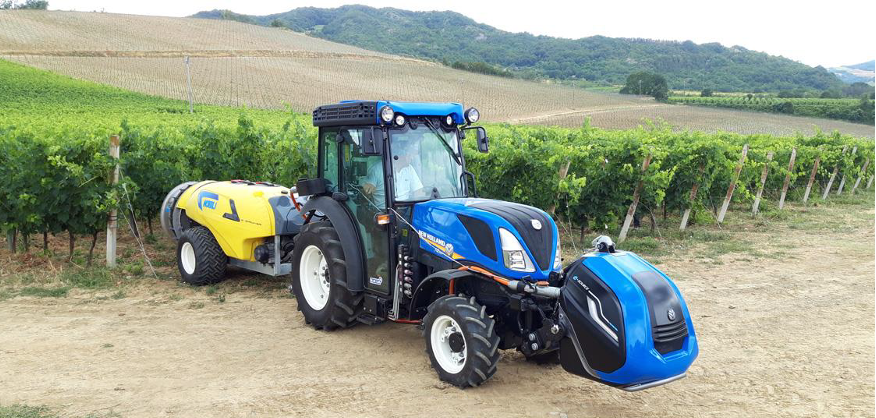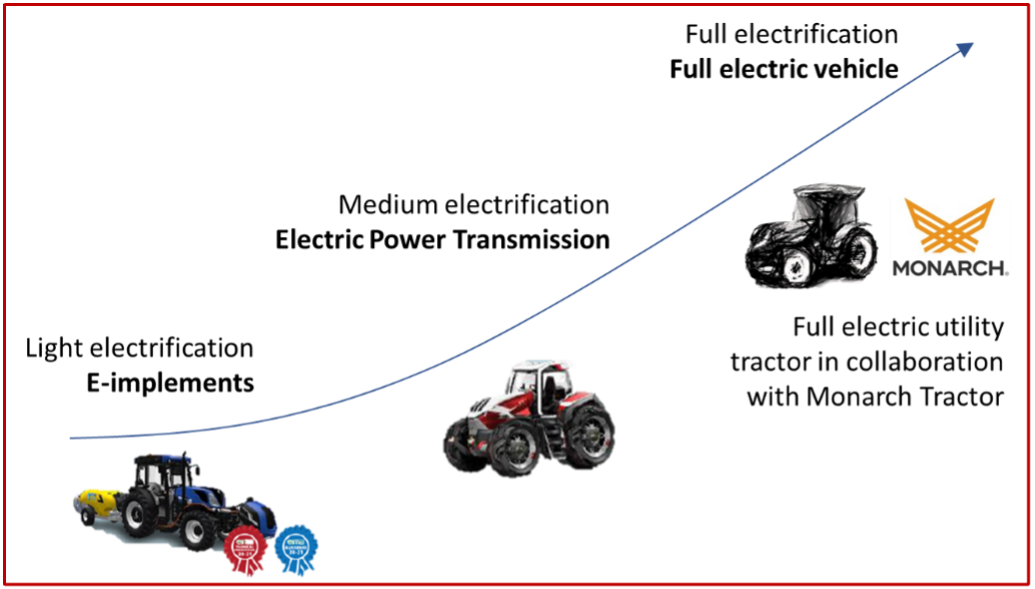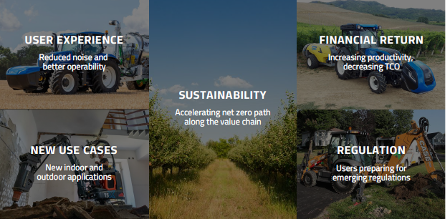CNH Industrial Journey to Electrification
As a testament to the long-lasting efforts towards sustainability, CNH Industrial has a long tradition in the electric vehicle sector and is determined to continue its journey.
Electrified vehicle technologies represent the next step in the Company’s decarbonization strategy, not as an alternative but rather as a means to further improve the performance, efficiency, and sustainability of internal combustion solutions. The technology is being developed to offer different features for different vehicle missions in both our Agriculture and Construction segments.
In Agriculture, three levels of electrification are currently being considered by CNH Industrial (see Figure 2):
- Light Electrification: E-implements
- Medium Electrification: Electric power transmission
- Full Electrification: Full electric vehicle
In farming, the key customer needs are higher productivity, reduced operating costs, and lower risk of cross contamination. In particular, customers seek precision applications of fertilizers and chemicals, optimized planting and seeding, and minimal soil damage. Electrification, combined with automation, is seen as an optimal solution to achieving these needs.
In Construction, on the other hand, key customer needs are zero emissions and reduced noise in order to operate in urban and indoor environments, while lowering operating and maintenance costs.
The development of these technologies is a key element of our path to zero carbon commitment. In addition to a rich history of innovation in clean energy technology, CNH Industrial in-house capabilities are boosted by strategic partnerships that support the creation of a strong product pipeline for zero carbon future, aligning our vision to customers’ needs and to sustainability.
FOCUS: ELECTRIFICATION IN AGRICULTURE
Agriculture equipment electrification is following a similar path to the automotive industry, progressively replacing inefficient and noisy hydraulics and mechanical systems along the vehicle accessory value chain up to a fully electrified battery powered e-propulsion system.
Electrification can help overcome conventional farm vehicles’ inherent inefficiency and productivity constraints by improving overall system efficiency, weight distribution, and reducing noise and environmental emissions. Additionally, electrification has inherent benefits of providing sophisticated vehicle controls, thereby enabling autonomy and other intelligent solutions.
To satisfy our customer’s needs, electrification of agricultural equipment is a key component of CNH Industrial Technology roadmap:
- Light Electrification: On-board electric power generation from the combustion engine to be used for electrified implements.
- Medium Electrification: Hybrid electric propulsion systems comprised of a combustion engine and electrified driveline.
- Full Electrification: Battery Electric Tractors with no combustion engine.
Since March 2021, CNH Industrial is a minority investor in Monarch Tractor. Monarch developed the first fully electric autonomous tractor on the market, which will contribute to accelerating agriculture’s transition towards autonomy and electrification. This strategic partnership is an important step towards further enhancing long-term sustainability, enabling the world’s farmers and agribusinesses to realize profitable zero-emission farming. It also underscores the Company’s commitment to rapidly improving its alternative propulsion and precision farming portfolio, while extending its world-leading sustainability credentials.
KEY ENABLERS OF TECH ADOPTION
Over the past five years, battery costs have dropped by nearly 80%, controls and electronics have become cheaper and more powerful, and high-speed charging capability and availability has improved by over 50% (note: long term cost reduction trends, momentarily impacted by the current geopolitical context). As system costs continue to drop and charging capability becomes more available, the adoption rate of electrification technology is expected to increase.
In addition, the foreseen benefits of automation and continued expansion of data-related services will significantly expedite the introduction of electrified equipment - electrification could account for a considerable percentage of total volumes of low hp tractors in developed countries by 2035.
Customers are demanding improved productivity, drivability and sustainability and CNH Industrial is committed to continue its journey towards electrification as a key enabler to meet its customers’ needs.




